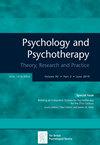Associations between psychological inflexibility processes, pre-sleep arousal and sleep quality
Abstract
Objectives
Psychological inflexibility, the model of psychopathology underlying Acceptance and Commitment Therapy (ACT), has been linked to a broad range of psychological problems, but its link with sleep quality is not well understood. This study aimed to identify relationships between psychological inflexibility processes (cognitive fusion, experiential avoidance, limited perspective-taking, lack of present moment awareness and inaction) and sleep quality, investigating pre-sleep arousal and anxiety symptomatology as mechanisms mediating these relationships.
Design
A correlational, cross-sectional design was used to test two statistical models.
Methods
Participants (N = 704) from a general population sample completed an online survey, reporting on sleep quality, pre-sleep arousal, anxiety and measures of psychological inflexibility. Data were analysed using correlations and path analyses.
Results
All psychological inflexibility processes were moderate to strongly correlated with sleep quality. Path analysis showed cognitive fusion, lack of present moment awareness and experiential avoidance, mediated by pre-sleep cognitive and somatic arousal, explained 49% of the variance in sleep quality (Model 1). Cognitive fusion via pre-sleep cognitive arousal had the largest effect. Anxiety preceding pre-sleep arousal (Model 2) explained no additional variance, and model fit was poorer than Model 1.
Conclusions
These findings highlight the role of psychological inflexibility processes in disrupting the de-arousal process needed for healthy sleep, supporting evidence for ACT as a treatment for sleep disturbance.





 求助内容:
求助内容: 应助结果提醒方式:
应助结果提醒方式:


